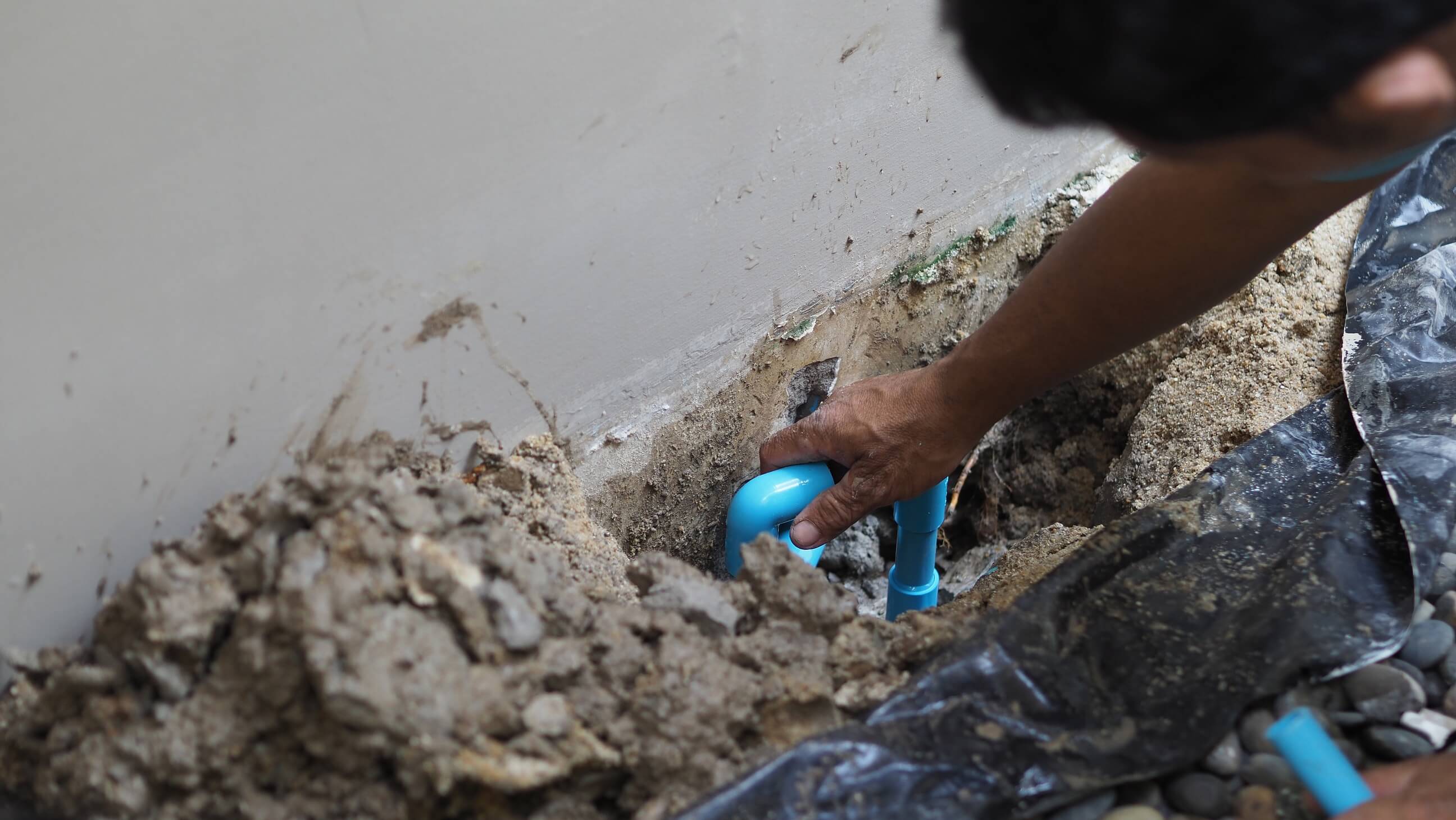
By Michele Lerner
Most people love a water view, the sound of a trickling fountain and the serenity of living near a creek or a pond. But, as residents across the U.S. saw this summer, water can be as devastating as it is enticing. Whether the water comes from an internal source such as a burst pipe or from an external source such as a flood, the toll can be steep
The average home insurance claim for water damage is about $10,000, but some claims can top $500,000. In 2017, insurance companies paid out $13 billion in water damage claims.
“I had a seller in Great Falls with a major waterproofing and grading issue, with too many plants close to the house and not enough backfill,” says Jeddie Busch, a Realtor® with Compass in Ashburn. “The house was already under contract and during the home inspection the buyer saw water seeping from the walls. The repair cost about $4,000 including a ton of backfill, plastic in between the backfill and new flooring.”
Janine Greenberg, a Realtor® with Coldwell Banker Realty in Reston, worked with sellers who found evidence from a home inspection of water damage in their basement when they purchased their home. After several years and many contractors who couldn’t identify the source of the problem, Greenberg suggested that they address the issue again before attempting to sell the home.
“I recommended a trusted home inspector who referred a foundation specialist,” says Greenberg. “It turned out the issue was hydrostatic pressure that caused moisture to come into the basement through the walls and cove joints. The solution was a new drainage system connecting to the sump pump, installation of a vapor barrier to protect the walls and a protective layer between the foundation, insulation and drywall layers.”
Water damage and disclosure issues
Home sellers can be confused about whether they need to disclose damage to their homes from previous incidents that have been repaired, particularly in the D.C. metro region, where Virginia, Maryland and D.C. laws may differ.
Generally, sellers in Virginia don’t have a duty to disclose anything as long as they are not actively concealing an issue, says John Altmiller, an attorney with Pesner Altmiller Melnick & DeMers in Tysons Corner.
“If someone fixes water damage, sells their home and then damage occurs in the same place three years later, the buyers may think they have a claim against the sellers,” says Altmiller. “But if the sellers thought they fixed the issue, it’s not fraud.”
Matt Troiani, NVAR chief counsel, points out that homeowners in Virginia are not required to disclose almost any issues, whether they have been corrected or not.
“I recommend that my sellers disclose issues that a buyer would not know under normal circumstances,” says Greenberg. “Some companies will give a lifetime warranty for their work that can be transferrable to the next homeowners. When I work with buyers, I check with the listing agent to see if there are any transferrable warranties to pass on.”
In D.C., sellers must provide a disclosure statement including any known defects relating to water and sewer issues, says Sam Nassar, a Realtor® with Compass in Washington, D.C. and McLean. Many water issues are also related to the presence of lead in older homes, Nassar says.
“If you have conducted any lead tests on the water supply to the property, you’ll need to disclose the results,” Nassar says. “You’ll also need to let the buyer know if there is any lead-bearing plumbing, including the service line coming into the property or if the property is listed on the D.C. Water website as one with lead service lines. If you know if any part of the lead water lines has been replaced, you need to disclose this with the date of replacement.”
While Altmiller points out that a listing agent in Virginia has a statutory duty to disclose material adverse facts that pertain to the physical condition of a property, those facts must be actually known by the agent.
“But agents are not held liable if they provided wrong information to buyers if the false information was provided to them by their seller clients,” Altmiller says. “Effectively, an agent can believe their clients if they tell them there are no issues with the property, as long as the agent has no reason to believe their client is being untruthful.”
The best thing an agent can do, says Altmiller, is refer their sellers and their buyers to the correct person to inspect a property and to properly repair any damages.

“A Realtor® can have an impact on a transaction by encouraging the seller to disclose what they know,” says Austin Perez, a senior policy representative for the National Association of Realtors® (NAR) in Washington, D.C. “[In D.C. and Maryland,] if prior damage has occurred and the seller knows it, they must disclose this to the buyers, especially if it involved flooding.”
Further, Perez says that [in D.C. and Maryland] if a seller discloses something of material importance to their agent, the agent has a legal obligation to disclose.
“But there is an exception to this rule: if something is not within an agent’s area of expertise, license and training, they don’t need to investigate it or disclose something,” says Perez. “An agent can say ‘I’m not a flood risk expert or an insurance expert’ but they can point out something that’s reasonably apparent such as a sump pump.”
Lenders check Federal Emergency Management Agency (FEMA) maps to assess the necessity of flood insurance for borrowers. NAR is pressing FEMA to update their flood risk maps and to provide property-specific maps with information such as rainfall estimates and sea levels. Some of FEMA’s maps are based on 20-year-old information, says Perez.
“We’re also pushing FEMA to release claim payment information on individual properties, which currently is not available to buyers because of privacy issues,” says Perez.
Responsibility for storm damage
An unfortunately common post-storm occurrence is that trees become uprooted from overly saturated ground and topple over – often onto a neighbor’s property.
“Generally, unless the homeowners are negligent, they’re not liable for damage caused by their tree to the neighbor’s property,” says Altmiller. “The exception is if your neighbor can prove you were negligent in caring for the tree.”
For example, if your tree was struck by lightning and toppled, that’s considered an “Act of God” and you’re not liable for damages, says Altmiller.
“However, if an arborist told you your tree was structurally unsound, then the wind blew and your tree fell, your neighbor might be able to prove you were negligent and force you to pay for the damages,” Altmiller says.
Tips for dealing with water damage
An essential recommendation that a Realtor® can share with buyers and sellers related to water is the importance of thoroughly addressing the problem at the source rather than covering up the damage.

“Depending on the extent of the damage and what it’s affected, hiring a remediation company to properly care for the clean-up is crucial to avoid mold,” says Nassar. “Remove all the water and soaked materials as quickly as possible, remove interior wall surfaces and insulation, scrub walls and floors and be sure they’re treated properly. Make sure everything is dry before rebuilding.”
- When water damage occurs, call your insurance company first and hire a company that specializes in flood damage, says Busch. This is not a DIY project.
- If a buyer asks if they should buy flood insurance, Perez recommends providing a list of insurance agents that provide that type of insurance and suggesting to the buyer that it’s worth talking with that insurance agent rather than discouraging them from getting it.
- Third-party sites can provide flood risk information, but even the highest-risk property may or may not flood in any given year. These sites, such as Climate Check or Flood Factor, offer some historical context to help buyers.
- Realtors® can alert buyers to properties that have a high-risk rating for floods and suggest their home inspector carefully assess the home for previous water damage or flood mitigation efforts.
- A sump pump that’s been neglected can result in flood damage. Adding a back-up sump pump for $300 or $400 can prevent a domino effect of damages, says Nassar.